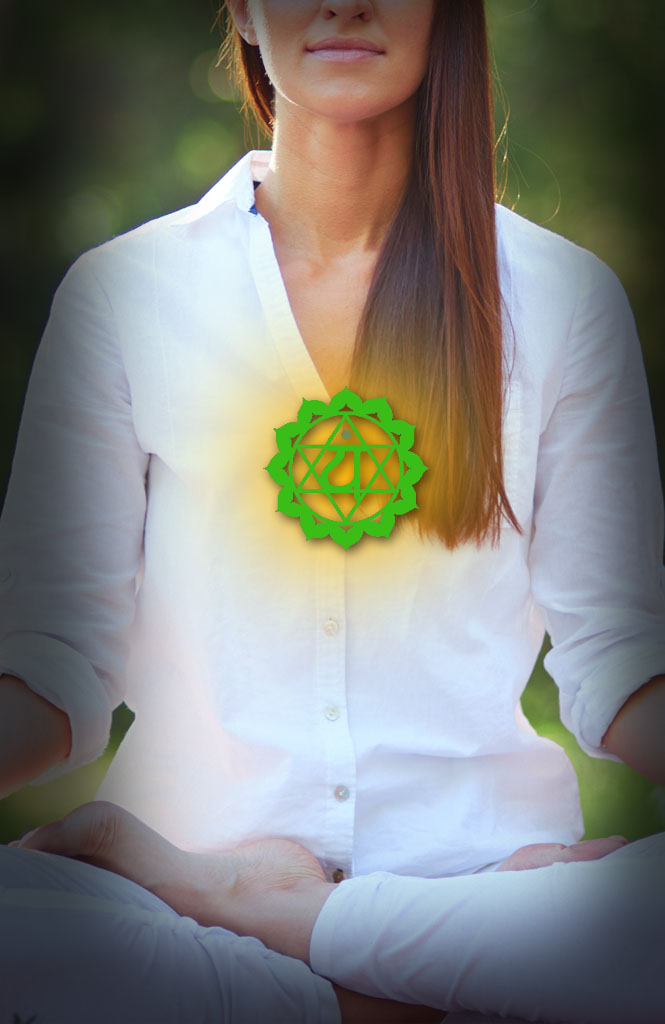
Its properties are:
Element: Air
Color: Green
Body Aspects: Circulatory system, lungs, breasts, heart, asthma, immune deficiencies
Instinct: Love
Psychological Instincts: Love, hope, surrender to another, compassion, intimacy
Gland: Thymus
Seeds: Selfless love, forgiveness
Negative Expressions: Ego aggrandizement, resentment, selfishness, grief, loneliness, abandonment, betrayal
The heart chakra is the axis of the chakra system. Just as the belly is at the center of gravity of the physical body, the heart is at the center of the luminous body. Chronologically, the heart chakra is associated with the ages of twenty-one to twenty-eight. It is the center from which we form our families.
Through the heart center we share and experience love, however the quality of love of the heart chakra is neither the affection we exchange with each other nor the romantic love we “fall” into. The heart chakra thrives on the love of Creation, the same love that the flowers feel for the rain or that the jaguar feels for the antelope that it will consume for sustenance. This kind of love is not object-focused, nor is it dependent on another for its existence. It is not sentimental. It is impersonal, selfless. Christian theologians call it agape. The Inka call it munay. This kind of love is not a means to an end. It does not lead to marriage or relationships. It is an end in itself.
To experience selfless love, we must die to who we have been in the past. Thus, shamans have devised intricate practices for experiencing the death of the ego and egotism. However, we do not need to go through the complicated death rites of the jungle shamans to experience the love of the heart chakra. We simply need to surrender to love — to translate love from a feeling into a practice and a meditation. We need to stop falling in love and become love itself. When you experience your heart beating, remind yourself that it is love that is beating.
One of the negative expressions of this chakra is an infatuation with the self. We all know people who claim to know that “love is the answer,” who spout all the right clichés about love. These individuals are more interested in demonstrating their “enlightenment” than in practicing charity or selfless love. Another negative expression of our love instinct is the inability to show compassion for ourselves. When self-love is absent, we become stuck in self-criticism and shame.
An impaired heart chakra makes us unable to commit to an intimate relationship. This person will run away at the moment she feels vulnerable, often using work or other distractions to keep herself from her beloved. A balanced heart chakra allows us to commit to intimacy in love. It integrates the masculine and feminine principles within us, and we no longer seek our “missing half” outside ourselves. Soft and hard, receptivity and creativity cease to be opposites, as these principles are joined in a delicate harmony. The heart center allows us to recover an innocence that makes us playful and inspired. We know who we are and we accept ourselves, which brings us joy and peace.
The heart chakra regulates the thymus gland, which is responsible for cell-mediated immunity. The thymus is one of the main players in immune response, critical in the development of B and T lymphocytes, the body’s “killer cells.” Persons with a depressed immune system respond excellently when the heart chakra is cleared through the Illumination Process.
The Sanskrit name for this chakra is anahata, which means “unbound.” It refers to how we become free from the material measures of success. Money, automobiles, fame, and fortune cease being the measures of achievement. Freedom, joyfulness, and an abiding peace become the hallmarks of a person who dwells in his heart center.
.







